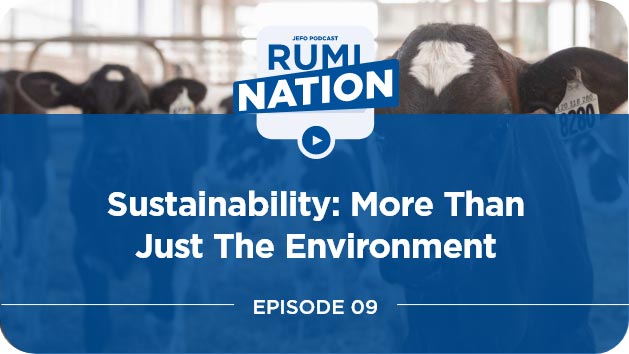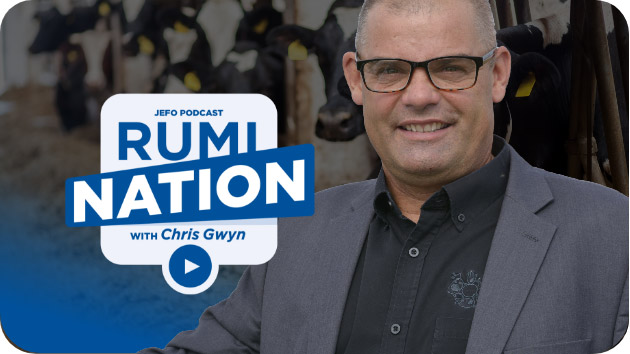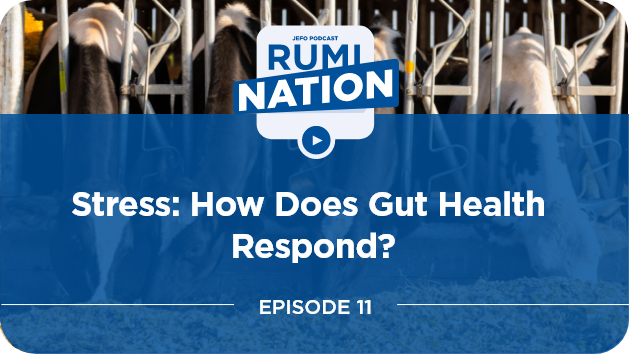RumiNation | S03 : E10
Considerations to Meet the Nutrient Needs of Early Lactation Animals
Brought to you by Jefo Nutrition
Share now!
Did you enjoy this episode?
Share now!
Considerations to Meet the Nutrient Needs of Early Lactation Animals
Research shows a link between amino acids, early lactation production and how an appropriate diet can help cows be more productive. This week’s guest, Dr. Ousama AlZahal is an expert on the subject.
Our guest - Dr. Ousama AlZahal
With more than 20 years of international experience working within the agricultural academic and industrial sectors, Ousama AlZahal has a strong practical understanding of global dairy, beef and small ruminant production systems and economics in North America, Latin America, Europe, Middle East, Africa and Australasia.

Timestamps & Summary
1:25
So, Dr. Azahal, I was hoping you would expand a bit for our audience about meeting the nutrient needs of early lactation cows, making sure we have high health, high component yield and successful rebreeding.
Dr. Ousama AlZahal
This is really an important topic that we always find ourselves going back to and discussing it with farmers and producers. And it is that cows have different requirements, and these requirements change throughout the whole lactation. And it is important that we ensure that these nutrients are delivered precisely and accurately. That does not only include the amount of feed that we give, but also the concentration of these nutrients and the bioavailability of those nutrients. So hence, it is important to measure dry matter intake, as much as possible, how much we are feeding and also do a frequent assessment of forage analysis and ration balancing.
7:36
Can you expand a bit more on how negative nutrient balances may play into hampering the performance?
Dr. Ousama AlZahal
Cows cannot eat enough to produce that amount of milk. And it runs into what we refer to very grossly as negative energy balance. But basically, energy itself is not a nutrient. But basically, that trend encompasses several nutrients. So, cows, during that time, are actually false negative in protein. So that will be a negative protein balance, minerals, vitamins, and some of these important molecules like the methyl group.
10:56
What role does dry matter intake play in negative nutrient balances how does it impact B vitamin synthesis?
Dr. Ousama AlZahal
That is a great question. Actually, in new research, new modeling coming out from University of Guelph geneticist’s lab, they tried to model the ruminant output of B vitamins, I think they precisely were working on B12, where they’ve seen that one of the biggest predictors for the output of B vitamins is basically dry matter intake. That goes back to the first point where the cows cannot eat enough during early stages to cover requirements, and they run into negative balances. Now B vitamins are unique and that dietary requirements are insufficient or basically non-existing. And the ruminant animal relies on ruminal synthesis.
16:33
You talked earlier about the role of methionine, contributing to creating methyl groups but also there is a key point where B12 and folic acid play a role as well, right?
Dr. Ousama AlZahal
Yes, that’s true, methionine is an essential amino acid, but there is some misunderstanding that mammals cannot synthesize it. Methionine synthesis basically requires a coupling of two cycles. The first one is the folate cycle which folate is B9, and the second cycle is the methionine cycle. And what really couples the two is B12. Basically, if you have a deficiency in B12 it can lead to a secondary deficiency in folic acid. I think there is quite a significant amount of research from Christiane Girard’s lab, just showing how the status of these two B vitamins are basically linked. So, methionine is really interesting. How it is very well connected, and also plays a role in the transformation pathways, which is the production of antioxidants.







